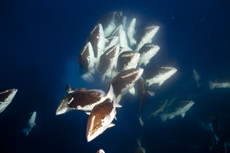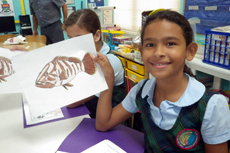On Monday, August 15, 2016, the Cayman Islands government enacted a comprehensive set of regulations aimed at recovering Nassau Grouper, an endangered Caribbean reef fish. The new regulations are based on more than a decade of collaborative fisheries research carried out by the Grouper Moon Project.
The regulations represent the Caribbean’s most progressive set of management actions for Nassau Grouper, and include:
- All take, possession, or sale of Nassau Grouper is prohibited from December through April, inclusive (during the spawning months for the species)
- When take is permitted (May – November), only fish between 16"-24” can be kept and no more than 5 Nassau Grouper per fishing vessel per day can be kept
- Nassau Grouper may not be taken on spear gun
Reef Environmental Education Foundation (REEF) initiated the Grouper Moon Project in 2001 in collaboration with the Cayman Islands Department of Environment. Ongoing research and education programming is conducted in partnership with scientists from Scripps Institution of Oceanography at UC San Diego and Oregon State University. The project is the Caribbean’s oldest continuous grouper spawning aggregation research program, and represents one of the most advanced, multi-faceted tropical fisheries research programs in the world.
Large-bodied groupers, such as Nassau Grouper, represent some of the most important fisheries in the Cayman Islands. They also contribute to the tourism economy by providing unique and highly sought-after interactive diving experiences, and play a crucial role in maintaining reef ecosystems in the region. Unfortunately, most large-bodied grouper species have experienced long-term heavy harvest. The Nassau Grouper fishery, in particular, was harvested to the point of collapse in the 1980s. Decades of fisheries research and adaptive management in the Cayman Islands have sparked a recovery in the species. The new regulations, enacted earlier this week, represent the culmination of the Cayman Islands’ commitment to science-based fisheries management.
Scientific products stemming from the Grouper Moon Project will continue to support healthy grouper fisheries in the Cayman Islands in the coming years, while maintaining the Cayman Islands’ global leadership in collaborative tropical fisheries research and management. The Grouper Moon Project is funded in part by the Lenfest Ocean Program and REEF donors. Peter Hillenbrand, Southern Cross Club, and Little Cayman Beach Resort/Reef Divers have provided significant field and logistics support for the research team. For more information, visit www.REEF.org/groupermoonproject.
The full text of the new Grouper Legislation is online here.
Reef Environmental Education Foundation (REEF) is a non-profit organization founded in 1990 that seeks to conserve marine ecosystems by educating, enlisting, and enabling divers and marine enthusiasts to become active ocean stewards and citizen scientists. REEF membership is free and totals more than 60,000 individuals worldwide, who protect marine life through education, service, and research.
 |  |  |
| Spawning Nassau Grouper. Photo by Jim Hellemn. | An Aggregation of Nassau Grouper. | Grouper Education Program Student. Photo by REEF. |
